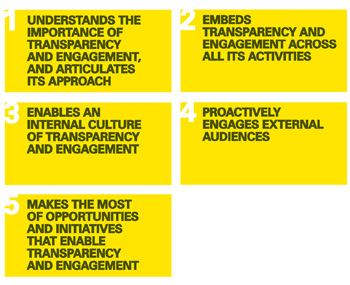ACF publishes new report on transparency and engagement
9 June 2020
The Association of Charitable Foundations (ACF) has published a new report on how foundations can increase their ambition and effectiveness through greater transparency and engagement.
Transparency and Engagement: The Pillars of Stronger Foundation Practice is the fourth report emerging from ACF’s Stronger Foundations initiative. To mark its launch, we are hosting a webinar for members on Friday 12 June; registration is now open for members.
The report sets out five characteristics of excellent foundation practice, which include embedding transparency across all the foundation’s activities, enabling an internal culture of transparency and engagement, and engaging external audiences including grant applicants and other foundations.
 Informed by 18 months of gathering evidence, the report emphasises the importance of engagement with external stakeholders and of sharing information not only on processes but on how decisions are made and why. It also encourages foundations to apply a lens of diversity, equity and inclusion to their engagement processes, ensuring that efforts to be more transparent make foundations more accountable to those they exist to support.
Informed by 18 months of gathering evidence, the report emphasises the importance of engagement with external stakeholders and of sharing information not only on processes but on how decisions are made and why. It also encourages foundations to apply a lens of diversity, equity and inclusion to their engagement processes, ensuring that efforts to be more transparent make foundations more accountable to those they exist to support.
To help understand why transparency and engagement matter, ACF states the many ways in which making deliberate and intentional decisions to be more transparent can increase a foundation’s effectiveness, for example by leading to more informed decision-making, and by boosting its legitimacy.
ACF chief executive Carol Mack said:
“Foundations are not immune from increasing public pressure on all institutions to be open. There is a growing interest not just in what they fund, but the source of their funding, where their assets are invested, and how decisions are made. This has become all the more pertinent in response to the outbreak of covid-19, which has magnified issues of power, inequality, and lack of accountability.
Many foundations have found greater transparency brings clear advantages; it builds trust and legitimacy, promotes efficiency and results in more equitable access to information. It can improve decision-making, enhance impact and increase influence. Indeed there are examples of excellent practice in transparency across the sector already. But there are also limits to transparency — and like all foundation assets and decisions, it needs to be deployed intentionally and effectively.
We hope this report offers an insightful, nuanced contribution on the theme of transparency an engagement, and, crucially, that it inspires foundations to take action that will boost their effectiveness in pursuit of social good.”
Chair of the Transparency and Engagement working group Paul Ramsbottom said:
“Transparency is an antidote to that great enemy of the foundation: complacency. Discussions throughout the working group’s programme of inquiry therefore took us into some of the central questions facing the foundation sector. Why do we exist? Where does our legitimacy lie? Who are our audiences, and to whom are we accountable?
One key point of consensus is that, in effective organisations, ‘transparency’ is less a series of actions or processes and more of a mindset. Crucially, genuine transparency also means more than simply broadcasting information. It is a mindset that makes engagement with key external stakeholders central: listening, reacting and adapting accordingly.
If knowledge is indeed power, then transparency and engagement are key tools in breaking down the traditional power dynamic between ‘funder’ and ‘recipient’.”
The report is now available to view and download.
Please direct any queries to Emma Hutchins, policy and communications manager, ACF: [email protected]